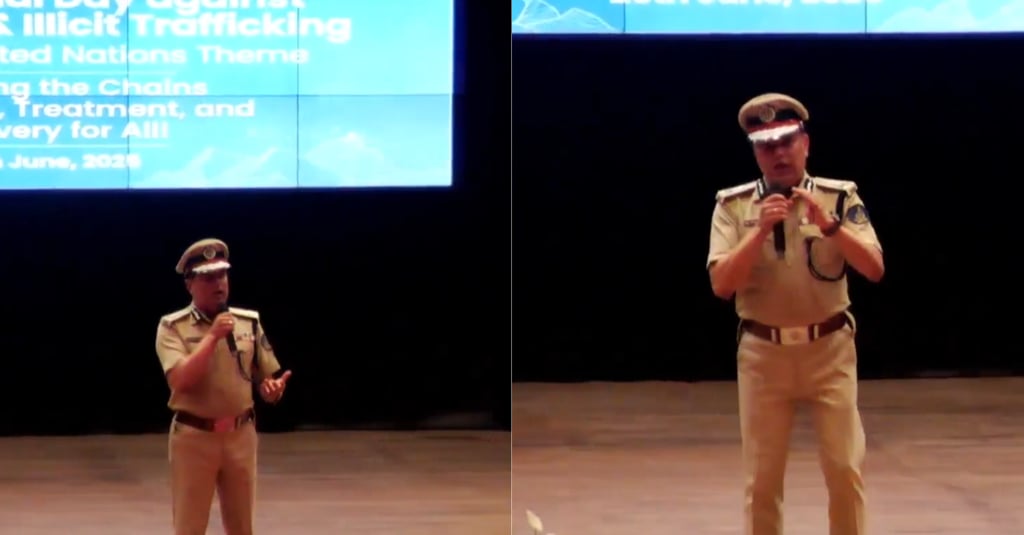'When protectors become predators, it’s dangerous', says Sikkim Police DGP Akshay Sachdeva on drug abuse fight
DGP Sachdeva said that the police are currently using two important laws to tackle drug crimes; the NDPS Act, which is a central law applicable across India, and Sikkim’s SADA Act, which deals with abuse of medicinal preparations.
LOCAL


On the occasion of International Day Against Drug Abuse and Illicit Trafficking 2025, Director General of Police (DGP) Akshay Sachdeva on June 26 said that law enforcement officers, civil administration, and the general public must join hands in the fight against the growing threat of drugs, particularly among the youth. The DGP said that collective action and strict enforcement are key to curbing the menace.
Speaking at a gathering of officials and stakeholders, the DGP reminded everyone of the core responsibility of the police as a law enforcement agency. "Whether it is the police administration or general administration, our duty is clear," he said. “We are here to enforce the law, and our focus in this fight is to reduce the supply of drugs.”
DGP Sachdeva said that the police are currently using two important laws to tackle drug crimes; the NDPS Act, which is a central law applicable across India, and Sikkim’s SADA Act, which deals with abuse of medicinal preparations. “We target three key areas in this battle — Demand Reduction, Supply Reduction, and Harm Reduction. Among these, supply reduction is where the police have the biggest role to play,” he said.
He said that most of the drugs entering Sikkim come from West Bengal, especially through Siliguri and Jalpaiguri. Items like brown sugar, heroin, spasmoproxyvon, nitrazepam, Corex, and Benadryl syrup are smuggled into the state through these routes. "Every district Superintendent of Police (SP), every Officer-in-Charge of police stations, and every Outpost (OP) officer must take full responsibility," he added.
He said that on average, 100 drug-related cases are registered annually in Sikkim, and these are not just reactive but are based on intelligence and planning. “We collect detailed information vehicle types, the clothes traffickers wear, the routes they use and work with various intelligence units to crack down on smuggling. This is a significant achievement,” he said.
DGP Sachdeva also thanked Chief Minister Prem Singh Tamang for launching the ‘War on Drugs’ initiative. “Since the CM’s directive, public support has increased greatly, and night-time crime, including substance abuse in nightclubs, has dropped by nearly 60%,” he said.
He spoke about the earlier rise in crimes such as molestation, POCSO cases and group fights, which often took place in public spaces late at night. “The zero-tolerance policy adopted by the Chief Minister has empowered police and brought real change,” he said.
“About 3–4% of government employees, including those in the police department, are either involved in drug use or trade. This is a painful reality, but I must speak the truth,” the DGP said. “In the last four years, we have registered six cases involving police personnel, some of whom used official vehicles to smuggle drugs. They were arrested and jailed.”
He appreciated the Chief Minister for never yielding to pressure, even when family members of the accused tried to intervene. “Sir, this is your greatness. You did not compromise even once. When protectors become predators, it is dangerous,” he said. “Sikkim Police salutes your leadership.”
The DGP also said that the SADA Act provides for psychiatric evaluation and action against government staff involved in drug abuse, showing that the government is treating the problem not just as a crime, but also as a health issue.
The DGP said that Sikkim’s efforts are closely aligned with Prime Minister Narendra Modi’s ‘Nasha Mukt Bharat’ campaign. He said that with all the measures now in place, the state is well on its way to achieving a Nasha Mukt Sikkim; a drug-free Sikkim.
